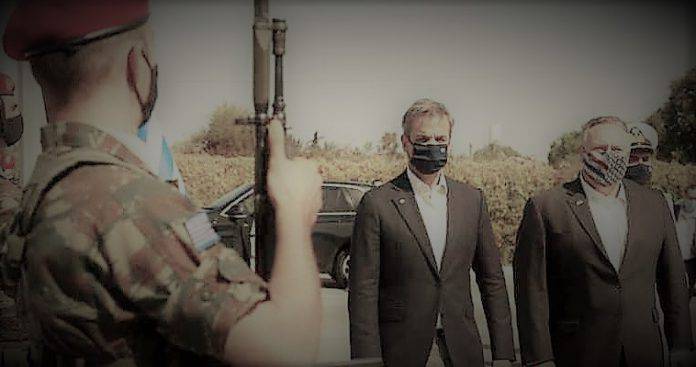Giorgos Margaritis: When you disguise dependence as alliance
05/10/2020
During the days that Mr. Pompeo was in Crete tasting Cretan delicacies at Mr Mitsotakis’s house, the same days that the Greek political elite was eagerly awaiting the decision on sanctions – or tools, or whatever – against troublemaker Turkey. The same days that NATO was shaping the “de-escalation” agreement, something else took place in the Black Sea.
The US Arleigh Burke-class guided missile destroyer, USS Roosevelt, conducted joint tactical exercises with the Turkish MEKO-class frigate, TCG Barbaros. This was the sixth time, in 2020, that US Navy units visited the Black Sea and practiced with Turkish Navy units.
For the main US naval squadron in the wider region, the four destroyers based at the Rota base in Spain, the Black Sea is the most common destination. Not that they have no other responsibilities. Their area of action includes the west coast of Africa and the entire Mediterranean.
The frequent missions of American and Turkish ships in the Black Sea are aimed at strengthening the dynamics of the anti-Russian alliance that is developing in the region from countries that belong to NATO or others that cooperate with it: Bulgaria, Georgia, Romania, Ukraine. Turkey’s role in promoting this alliance is crucial. The availability of the US Navy would not allow any kind of demonstration without the participation of the Turkish Navy. Developments in the South Caucasus will probably enhance the whole relationship and consequently the importance of Turkey in this strategic zone.
Mr. Pompeo honestly stated this directly to his Greek interlocutors: the confrontation in the region concerns Russia and China and only them. Any “differences” between Turkey and Greece simply deviate from the necessary focus on the goal. The logical conclusion is that these “differences” must be resolved as soon as possible as the US and NATO have other jobs to do. How to resolve the “disputes” is of little interest to Washington or Brussels.
Russia and China are the enemies
In the confrontation, in the desired containment of Russia, it is obvious that the importance of Turkey is much greater than that of Greece: the latter can not threaten anyone in the Black Sea, nor can it have any significance in the affairs of Crimea, Ukraine, or the Caucasus. Greece is useful as a rear base, only Turkey can serve as a strike force. This quality and potential is highlighted at every opportunity – from Libya to Iraq and the Caucasus.
The Greek-American defense agreement in which the previous and the current government invested a lot, the expansion of the Souda base, Alexandroupolis, Stefanovikeio, Larissa, have this character. At the political level, the unequivocal acceptance of all American claims and demands means that our country has been fully enlisted in the great cause of the western world. In its war. In short, these governments (Tsipras, and then Mitsotakis) endorsed that the enemy of Greece is China and Russia – not ally Turkey.
The political perception and the relevant awareness of reality by the two Greek governments so far that managed this “alignment” are unclear. It is noted that the beginning of this “alignment” was initiated with the famous Prespa Agreement that was called to serve the needs of NATO in the Western Balkans – namely the containment of reluctant Serbia.
So when we say that they are vague we mean that it is uncertain whether Athens’ moves were caused by the strategic choice of the necessary and desirable participation in the Western crusade against Russia and China or whether they indirectly tried to shield the country against Turkey through its full involvement in NATO projects. Both are possible, although the percentage of participation of each target in the policy pursued sometimes varies towards either option.
Return to western “normality” through Pompeo
In cases of apparent deviation, a visit by Mr. Pompeo or any other US official to Athens for correction and reinstatement follows. The latter justifies the second arrival of Mr. Pompeo in Greece in a short time. The mobilization of the Greek armed forces in Evros, the Aegean, and the eastern Mediterranean to counter Turkey posed the danger of a deviation. That is why the minister corrected the diversion through his pronouncements: the common rival is Russia and China, he stressed with deafening clarity.
Thus, the motto of the late Konstantinos Karamanlis “we belong to the West” (with emphasis on “belong”) overrides any other sub-interests of Greece, i.e. claiming the inviolability of its territory or defending its sovereign rights in seas and air. We have the feeling that the Greek governments are aware of the issue and the dangers of its contradictions. Having no alternative, they crawl helplessly behind developments pursuing a policy that is characterized by strong successive rebates across the range of national issues.
An option of this kind has no prospects. It is based solely on hopes and expectations, sometimes metaphysical. Either they are waiting for a miracle – maybe something like the Second Coming – or they wish the deadlocks to appear in the “watch” after theirs. The rest is just verbiage in the air. “Communication” as they say in current terminology.





